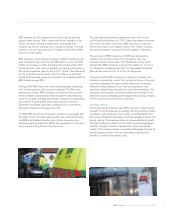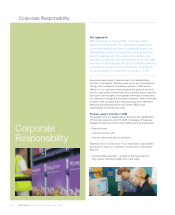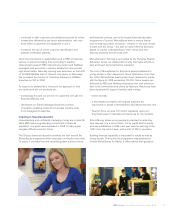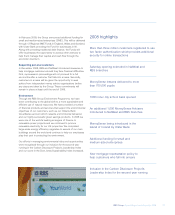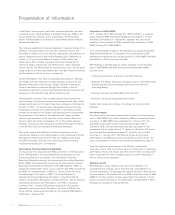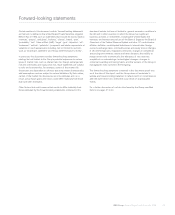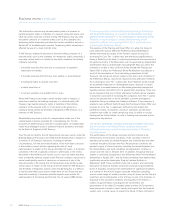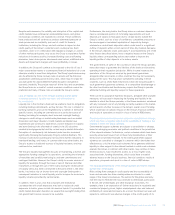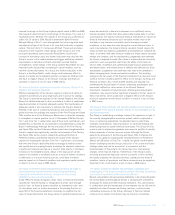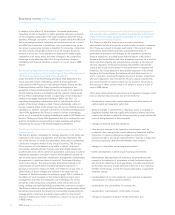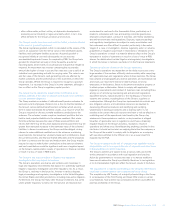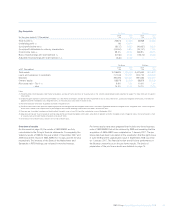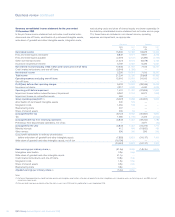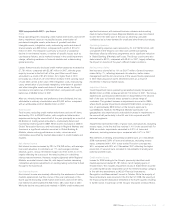RBS 2008 Annual Report Download - page 28
Download and view the complete annual report
Please find page 28 of the 2008 RBS annual report below. You can navigate through the pages in the report by either clicking on the pages listed below, or by using the keyword search tool below to find specific information within the annual report.
27RBS Group Annual Report and Accounts 2008
Group Manufacturing comprises the Group’s worldwide manufacturing
operations. It supports the customer-facing businesses and provides
operational technology, customer support in telephony, account
management, lending and money transmission, global purchasing,
property and other services. Manufacturing drives efficiencies and
supports income growth across multiple brands and channels by using
a single, scalable platform and common processes wherever possible.
It also leverages the Group’s purchasing power and has become the
centre of excellence for managing large-scale and complex change.
The Centre comprises group and corporate functions, such as capital
raising, finance, risk management, legal, communications and human
resources. The Centre manages the Group’s capital resources and
Group-wide regulatory projects and provides services to the operating
divisions.
Competition
The Group faces strong competition in all the markets it serves.
However, the global banking crisis has reduced the capacity of many
institutions to lend and has resulted in the withdrawal or disappearance
of a number of market participants and significant consolidation of
competitors, particularly in the US and UK. Competition for retail
deposits has intensified significantly reflecting the difficulties in the
wholesale money markets.
Competition for corporate and institutional customers in the UK is from
UK banks and from large foreign financial institutions who are also
active and offer combined investment and commercial banking
capabilities. In asset finance, the Group competes with banks and
specialised asset finance providers, both captive and non-captive. In
European and Asian corporate and institutional banking markets the
Group competes with the large domestic banks active in these markets
and with the major international banks.
In the small business banking market, the Group competes with other
UK clearing banks, specialist finance providers and building societies.
In the personal banking segment the Group competes with UK banks
and building societies, major retailers and life assurance companies. In
the mortgage market the Group competes with UK banks and building
societies. A number of competitors have either left or scaled back their
lending in the mortgage and unsecured markets. The Group’s life
assurance businesses compete with Independent Financial Advisers
and life assurance companies.
In the UK credit card market large retailers and specialist card issuers,
including major US operators, are active in addition to the UK banks. In
addition to physical distribution channels, providers compete through
direct marketing activity and the internet.
In Europe, Asia and the Middle East, the enlarged Group now competes
in retail banking with local and international banks. In a number of these
markets there are regulatory barriers to entry or expansion, and the
state ownership of banks. Competition is generally intensifying as more
players enter markets that are perceived to be de-regulating and offer
significant growth potential.
In Wealth Management, The Royal Bank of Scotland International
competes with other UK and international banks to offer offshore
banking services. Coutts and Adam & Company compete as private
banks with UK clearing and private banks, and with international private
banks. Competition in wealth management remains strong as banks
maintain their focus on competing for affluent and high net worth
customers.
RBS Insurance competes in personal lines insurance and, to a limited
extent, in commercial insurance. There is strong competition from a
range of insurance companies which now operate telephone and
internet direct sales businesses. Competition in the UK motor market
remains particularly intense, and price comparison internet sites now
play a major role in the marketplace. RBS Insurance also competes with
local insurance companies in the direct motor insurance markets in
Spain, Italy and Germany.
In Ireland, Ulster Bank and First Active compete in retail and
commercial banking with the major Irish banks and building societies,
and with other UK and international banks and building societies active
in the market.
In the United States, Citizens competes in the New England, Mid-
Atlantic and Mid West retail and mid-corporate banking markets with
local and regional banks and other financial institutions. The Group also
competes in the US in large corporate lending and specialised finance
markets, and in fixed-income trading and sales. Competition is
principally with the large US commercial and investment banks and
international banks active in the US.
Risk factors
Set out below are certain risk factors which could affect the Group’s
future results and cause them to be materially different from expected
results. The Group’s results are also affected by competition and other
factors. The factors discussed in this report should not be regarded
as a complete and comprehensive statement of all potential risks
and uncertainties.
The company may face the risk of full nationalisation and under such
circumstances shareholders may lose the full value of their shares.
Under the provisions of the Banking Act, substantial powers have been
granted to HM Treasury, the Bank of England and the FSA as part of
the Special Resolution Regime to stabilise banks that are in financial
difficulties and may fail. The Special Resolution Regime gives the
authorities three stabilisation options: private sector transfer; transfer to
a ‘bridge bank’ established by the Bank of England; and temporary
public ownership (nationalisation).
The stabilisation options may only be exercised if the FSA is satisfied
that a UK-incorporated institution with permission to accept deposits (i)
is failing, or is likely to fail, to satisfy the threshold conditions set out in
the FSA’s Handbook and (ii) it is not reasonably likely that action will be
taken that will enable the relevant entity to satisfy those threshold
conditions. The threshold conditions are conditions which an FSA-
authorised institution must satisfy in order to retain its FSA authorisation.
They are relatively wide-ranging and deal with most aspects of a
relevant entity’s business, including, but not limited to, minimum capital
resource requirements. It is therefore possible that the FSA may trigger
the Special Resolution Regime before a relevant entity is in severe
difficulties.


